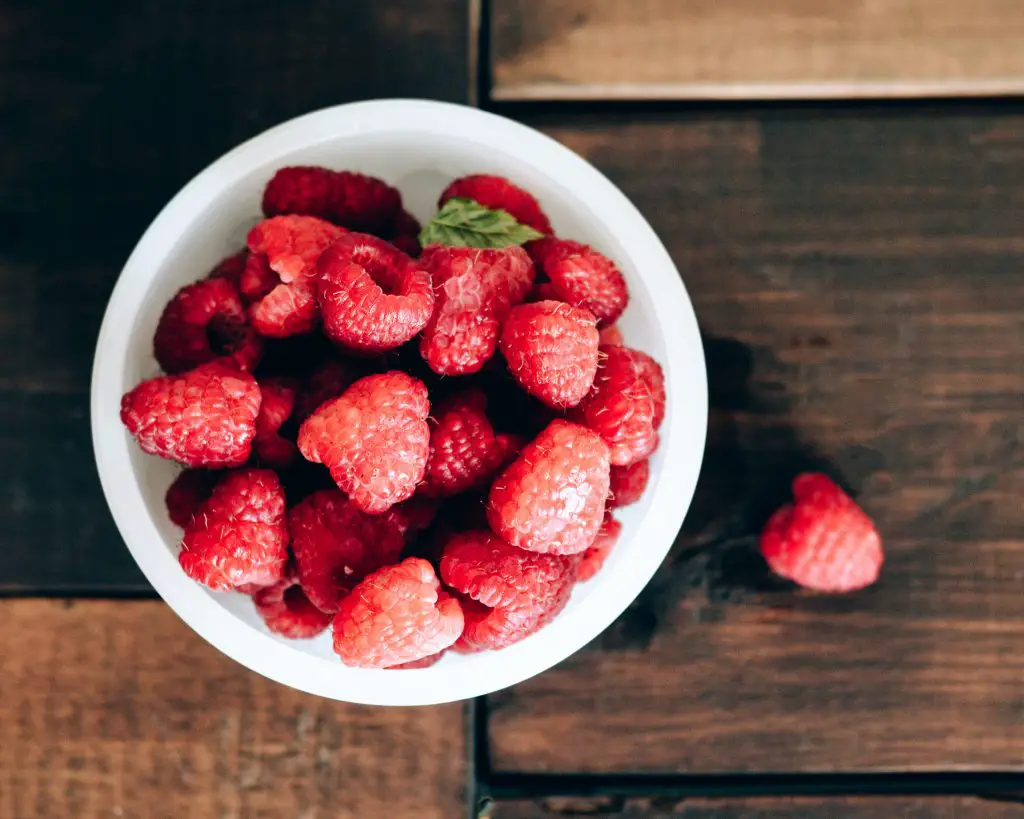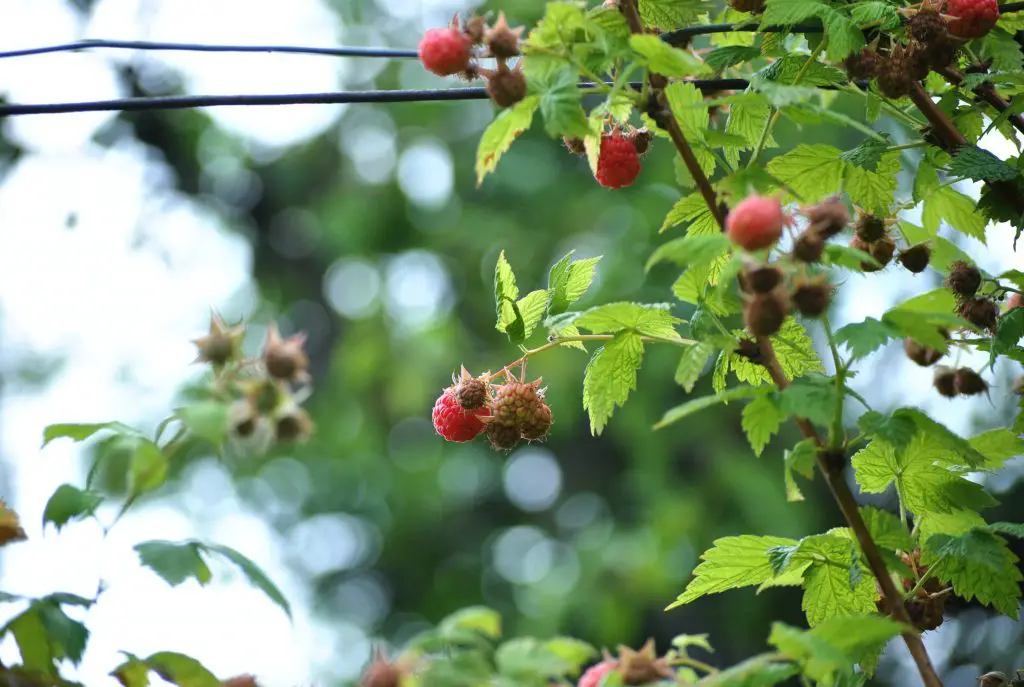How Many Raspberries Will One Plant Produce? When deciding whether to devote some space in your garden to a Raspberry plant a primary consideration is how much does it produce per year.
The volume of fruit produced by a single Raspberry plant is approximately 7 kg (15 lb) however this varies significantly with the variety grown. In a trial conducted by the Royal Horticulture Society, they compared 27 varieties over a 3 year period. In this trial, the volume of Raspberries varied between 2.1 and 14.6 kgs (4.6 to 32 lbs) with Summer fruiting varieties generally producing higher yields than Autumn fruiting varieties.
For those unfamiliar with Raspberries, there are two main types, Summer Fruit, and Autumn fruiting. The main difference between these types is the age of the cane that the fruit forms on. This in turn affects the time of year that the fruit is harvested.
Autumn varieties fruit on this year’s new canes and once the season is finished the canes can be cut down to the ground ready for the next season. Whereas Summer varieties produce fruit on growth that is one year old. For these varieties, only the old canes are removed at the end of the season leaving the current years’ growth ready to fruit the following year.

The other characteristic of Summer fruiting varieties is they tend to have much longer canes than the Autumn varieties. They can grow up to 3 m (10 to 12 ft) long which requires the cane to be looped across the surface of a support structure and then tied in.
Which Type of Raspberry Should You Grow?
Both the Summer and Autumn varieties have advantages and disadvantages. As such it is common for gardeners to grow a variety or two of each type as it extends the harvest period and reduces the risk of failure in a season.
However, if you are growing Raspberries for the first time Autumn fruiting varieties are definitely simpler and easier to grow. The main reason for this is that you can get away with having a really basic support structure because most varieties only produce canes that are 1.5m tall (5 ft).
Additionally, the canes only need to be supported through the summer, so you can generally get away with a couple of stakes and some string. This is usually enough to keep the Raspberries upright and off paths during the growing season.
The other key reason Autumn fruiting varieties are easier is because the management of the canes is simpler. All that is required is to cut the canes down to the ground at the end of the season. However, some gardeners chose to cut only half the canes down because it will extend the harvest period the following season.

The canes of Autumn varieties will produce a second crop of Raspberries if left for one year. However, because the canes are already established the fruit arrives earlier in the season spreading the harvest.
The primary advantage of the Summer fruiting varieties is that they generally produce a higher yield than the Autumn fruiting varieties. The trade-off for the gain in additional yield is that there is more work at the end of the season. This is because you need to prune out the old canes and then spent time tying in this season’s growth ready for the following season.
What Are The Highest Producing Raspberry Varieties?
If you decide to grow Raspberries the next question is what are the best varieties to grow. The most authoritative study I have found comparing the performance of different Raspberry varieties is the RHS study conducted from 2007 to 2009. In this study a panel of experts evaluated 27 varieties against the following criteria;
- Fruit quality – taste, appearance, size
- Yield – overall weight per plant and weight per fruit
- Plant habit – uprightness, length of laterals and their strength of attachment, ease of picking, cultivation, etc.
- Plant vigor
- Resistance to disease
- Duration of the fruiting season
| Variety Name | Type | Yield | Comment |
| Tulameen | Summer | 14.6 | Of the cultivars, tested RHS concluded this to be the best. It has strong spineless canes that are easily handled. It produced the highest yield in all three years of trial, with fruits being relatively large. It also appeared to be resistant to pest and diseases. |
| Glen Magna | Summer | 12.2 | The cultivar was found to be very vigorous with long canes being produced. It produced large fruit with a good flavor. Yields were consistently high and the cropping season was relatively long. |
| Glen Ample | Summer | 11.6 | A good commercial variety, in previous trials it has produced similar yields to Tulameen. It has large fruit with a good flavor. |
| Caroline | Autumn | 9.9 | This variety was highly rated by the Judging panel because of its superb flavor when fully ripe and berry size. It outcropped all other autumn fruiting cultivars. |
| Malling Jewel | Summer | 8.8 | This variety was recommended for home gardeners because of its lovely raspberry flavor and relatively compact growth habit which makes it easier to manage than other varieties. |
| Joan J | Autumn | 8.2 | This variety was recommended for the home gardener due to its compact size. The flavor was rated highly however the berry size was more variable than other varieties tested. |
| All Gold | Autumn | 7.8 | This was the only yellow/golden fruited cultivar in the trial. It was a relatively late variety with yield peaking at the end of August and early September. It has an upright habit with easy to manage canes. |
| Polka | Autumn | 6.9 | This cultivar was a relatively early variety that gave an early flush of fruit. The berry size and appearance was rated highly. |
| Autumn Britten | Autumn | 6.5 | This cultivar has very thorny canes and not very nice to handle. The good-sized fruit but they had a tendency to break up on picking. On balance, the panel felt that other cultivars were superior. |
| Malling Admiral | Summer | 4.9 | This variety is very vigorous and has dark berries. It is relatively easy to handle and is spine-free. The fruiting laterals are long which makes them susceptible to damage in windy conditions. The quality of the fruit is relatively high. |
| Autumn Bliss | Autumn | 2.1 | The RHS noted that Autumn Bliss performed relatively poorly in this trial. They suspect it is related to a defective rootstock. They stated on the basis of prior they continue to recommend this variety. |
An additional note regarding the Autumn Bliss variety is that I personally concur with the RHS assessment that it is a good quality variety. I have grown it in my own garden over the last few years and it is a reliable performer and the volume of berries yielded in the trial does seem relatively low compare to what I have observed. But I have never gone to the effort of quantifying it.
Several of the varieties listed in the table above are available online through Thompson & Morgan or yougarden.com.
In conclusion including Raspberries in your garden is well worthwhile. The taste is far superior to Raspberries purchased from the grocery store so give them a go.
